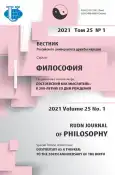Rethinking the Integrative Dimension of Theology with Science: Syntheses and Congruences
- Authors: Dura I.1, Mihălescu I.1, Frățilă M.1, Cîrceie V.1, Borcan R.1
-
Affiliations:
- Ovidius University
- Issue: Vol 25, No 1 (2021): DOSTOEVSKY AS A THINKER: TO THE 200TH ANNIVERSARY OF THE BIRTH
- Pages: 121-129
- Section: PHILOSOPHY. RELIGION. CULTURE
- URL: https://journal-vniispk.ru/2313-2302/article/view/324983
- DOI: https://doi.org/10.22363/2313-2302-2021-25-1-121-129
- ID: 324983
Cite item
Full Text
Abstract
If we want to define today's society in one word, trying to capture its meaning, it would be polarization. The interdependence between all social segments, articulated by globalization, has a double function: unpacking the identitary elements that enter in the structure of society (religion, politics, culture, science, etc.) and framing them in a relational dynamic. In this situation are Theology and Science, which, of course, maintain a number of components under their general names. Can we talk about a congruence between these two dimensions of human knowledge? Or they are developing completely separately and antagonistic in social progress? According to Ian G. Barbour there are four types of relation between Science and Religion: conflict, independence, dialogue, integration. This article intends to highlight the congruence between Theology and Science in the paradigm of neo-patristic synthesis , which explores in a phenomenological, theological and philosophical way the relationship between these two. Neo-patristic synthesis is a theological movement from the 20th century, generated by the initiative of the orthodox theologian G. Florovsky.
Keywords
About the authors
Ioan Dura
Ovidius University
Author for correspondence.
Email: dura.ioan@univ-ovidius.ro
PhD., Lecturer, Ovidius University of Constanta, Faculty of Theology
Aleea Universitatii nr. 1, Corp A, Constanta, 900470, RomaniaIonel Mihălescu
Ovidius University
Email: dura.ioan@univ-ovidius.ro
PhD, Ovidius University of Constanta, Faculty of Theology
Aleea Universitatii nr. 1, Corp A, Constanta, 900470, RomaniaMihai Frățilă
Ovidius University
Email: dura.ioan@univ-ovidius.ro
PhD, Ovidius University of Constanta, Faculty of Theology
Aleea Universitatii nr. 1, Corp A, Constanta, 900470, RomaniaVictor Cîrceie
Ovidius University
Email: dura.ioan@univ-ovidius.ro
PhD, Ovidius University of Constanta, Faculty of Theology
Aleea Universitatii nr. 1, Corp A, Constanta, 900470, RomaniaRubian Borcan
Ovidius University
Email: dura.ioan@univ-ovidius.ro
PhD, Ovidius University of Constanta, Faculty of Theology
Aleea Universitatii nr. 1, Corp A, Constanta, 900470, RomaniaReferences
- Neven G. Doing Theology without God? About The Reality of Faith in the 21st century. Journal Cultural and Religious Theory. 2005; (6.3): 30.
- Ward G. Deconstructive theology. In: Vanhoozer KV, editor. The Cambridge Companion to Postmodern Theology. New York: Cambridge University Press; 2003. P. 76-91.
- Dura I. Regula Fidei şi deconstrucţia învăţăturii de credinţă. Simbolul niceo-constantinopolitan în condiţia postmodernismului. Theologia Pontica. 2010;(1-2): 81-95. (In Romanian).
- Stăniloae D. Orthodox Spirituality. St. Tikhon`s Orthodox Theological Seminary Press; 2002. P. 17.
- Stăniloae D. Teologia Dogmatica Ortodoxă. Volume I. București: EIBMBOR; 1996. P. 71. (In Romanian).
- Popescu D. Omul fără rădăcini. București: Nemira; 2001. (In Romanian).
- Barbour G. When Science Meets Religion. Enemies, strangers, or partners? HarperCollins; 2000.
- Nesteruk A. Universul în comuniune. Către o sinteză neopatristică a teologiei și a științei. București: Curtea Veche; 2009. (In Romanian).
Supplementary files









